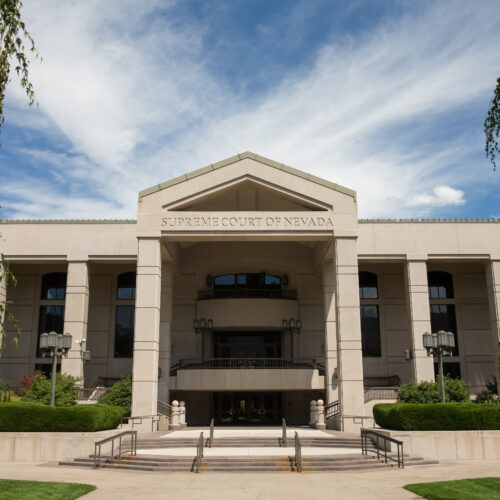Nevada Supreme Court issues order on early case resolution

Pleading the Sixth: A huge victory for right to counsel advocates in Nevada will most assuredly cause reverberations across the country. More than a year after the public defenders in Reno asked the Nevada Supreme Court to rescind a district judge’s order authorizing an early case resolution (ECR) project that did an end-around the county’s institutional defenders, the Court responds with an order that lets the project stand only if the ECR program uses the public defender office and the public defenders remains free to follow their ethical responsibilities in doing so. Vitally, the Court declared that any rule interfering with a public defender’s constitutionally protected independence might henceforth be considered an actual or constructive denial of assistance of counsel that is legally presumed to result in prejudice. In this story, the 6AC discusses the importance of the order on defender services in Reno and argues that dicta in the Court’s order offers a way to use Strickland to address systemic deficiencies resulting from a lack of independence anywhere and everywhere.
On October 9, 2013, the Nevada Supreme Court issued an order that will most assuredly have both local and national repercussions. At home, the Washoe County (Reno) institutional public defenders will now be free to determine if they have sufficient time to properly prepare a case before extending a plea offer to their clients in any future early case resolution (ECR) program. Nationally, the Nevada Supreme Court reaffirmed that public defender independence is “constitutionally protected” and that any infringement on independence comes at the risk of finding an actual or constructive denial of assistance of counsel resulting in prejudice under Strickland v. Washington (the U.S. Supreme Court case that sets out the threshold to be met to determine whether an attorney provided “effective” assistance of counsel by requiring a showing of attorney error and that the error had an impact on the outcome of the case). The Sixth Amendment Center (6AC) believes that the dicta in the opinion offers a way to address the most egregious aspects of our nation’s right to counsel crisis related to undue interference on the defense function. Let us explain the local and national aspects of the story.
The Washoe County Early Case Resolution Program
On June 8, 2012, Washoe County Chief Judge of the Second Judicial Court, David Hardy, issued Administrative Order 2012-07 that created a pilot early case resolution project that, rather than appoint the Washoe County Public Defender as statutorily directed, instead allowed judges to determine on a case-by-case basis whether to appoint Washoe Legal Services (WLS) – a civil legal aid program – as co-counsel alongside the Washoe County Public Defender for the sole purposes of extending an initial district attorney plea offer. That the term “co-counsel” was merely a ruse to get around clear statutory appointment language is laid bear by the administrative directive that the Public Defender “shall have no further responsibilities” to the defendant unless “the case is removed from the ECR Pilot Program.” On June 29th of the same year, the Washoe County Public Defender’s Office petitioned the Nevada Supreme Court to direct Judge Hardy to “rescind or vacate” his order through a writ of mandamus (the legal term for a court order directing a governmental agency to perform an act required by law). The new order is in response to that writ of mandamus. [Click here, for more background information on this story.]
“Nothing in the Nevada Revised Statutes prohibits the implementation of an early case-resolution pilot program,” announced a unanimous Nevada Supreme Court on October 9, 2013, in finding no statute prohibiting the use of ECR programs per se. At the same time, however, Judge Hardy’s pilot ECR program barred the institutional defender from doing any work on the case unless and until the case failed to be disposed through ECR. As such, the Nevada Supreme Court concluded that the district judge’s administrative order “does interfere with the independence of counsel,” and therefore this specific ECR program cannot be reconstituted unless the institutional public defenders are free to participate in the program and are free to zealously advocate for their clients in accordance with their professional ethics.
Much of the order clarifies a long-standing debate in Nevada about the relevance of public defender performance standards. As background, the American Bar Association’s Ten Principles of a Public Defense Delivery System requires indigent defense providers to be trained and reviewed against performance standards, based on national guidelines, but tailored to state laws and the requirements of local practice (Principle 10). Many public defense delivery systems and state bar associations have done just that. The Louisiana Public Defender Board, for example, has promulgated specific standards for all attorneys representing clients in adult criminal trials, juvenile delinquency cases, child in need of care (CINC) matters, capital trials, and other right to counsel matters. Similar requirements have been adopted for attorneys handling public counsel cases in Arizona, Colorado, Connecticut, Indiana, Maine, Massachusetts, Montana, North Carolina, North Dakota, Oregon, Pennsylvania, Texas, Virginia, Washington, and elsewhere.
Nevada joined this group when the Nevada Supreme Court issued Administrative Order ADKT-411 in 2008. ADKT-411 instituted performance standards for attorneys in trial-level adult criminal, juvenile delinquency, and appellate representation. (This is the same order that, among other things: removed the judiciary from the oversight and administration of indigent defense; ordered case-weighting studies; promulgated a uniform indigency standard; and required each county to submit local plans for the delivery of indigent defense services to the Supreme Court.)
Prior to the 2008 ADKT-411 order, Washoe County had a very problematic early case resolution program, in which public defenders did not always have the state’s discovery in the client’s file before discussing the plea offer with him or her, and sometimes only had a statement of probable cause. On top of this, the Washoe County District Attorney placed stringent time requirements as to when a plea bargain must be accepted or be taken off the table. When ADKT-411’s performance standards were handed down, the Washoe County Public Defender concluded that he could no longer participate in the ECR program while adhering to the courts new standards, and immediately terminated the office’s participation in the ECR program.
A battle ensued wherein the proponents of the ECR program claimed that Strickland specifically prohibits any comprehensive checklist of measures that bind a defender to performing specific tasks in every single case. And, indeed, Strickland does prohibit the use of checklists in the exact manner suggested by the ECR advocates. Performance standards, the Strickland Court acknowledges, are “guides to determining what is reasonable, but they are only guides.” However, ECR advocates take this statement to mean, therefore, that performance standards are inherently meaningless. As the argument goes, if performance standards are non-binding, a defender cannot invoke them as the reason universally to pull out of all cases set for early resolution.
But that is not what Strickland says. The Strickland Court is quite clear that a mandatory checklist does not pass constitutional muster – not because performance standards are meaningless – but because mandatory checklists “interfere with the constitutionally protected independence of counsel.” Imposing universal performance standards that must be followed always and forever would, in the words of the Strickland Court, “restrict the wide latitude counsel must have in making tactical decisions.” That is, there may be perfectly legitimate reasons for a defense attorney in a particular case to decide against, for example, filing a specific motion or conducting a specific investigation. To the Strickland Court, the freedom to make those independent strategic decisions, in consultation with the defendant, is preeminent and a core principle of due process.
In other words, just because there may be a perfectly good strategic reason for not conducting a thorough investigation in one, or even many cases, it does not logically follow that a lawyer therefore never has to ever investigate any case (which essentially is what the Washoe County early case resolution program sought to do). Indeed, a lawyer needs time to determine which particular cases warrant which particular actions. And that is the true value of performance standards – they serve as guides of what a lawyer should consider doing in each case. The system’s obligation then is to ensure that each attorney has sufficient time to do so on behalf of each client and in every case.
The brilliance of the recent Nevada Supreme Court order is that it concludes that without independence of the defense function, there are too many factors that will infringe on the necessary time needed for a defender to do what he is supposed to do under performance standards. The Court affirms in no uncertain terms that a public defender’s independence is “constitutionally protected.” It then takes the same reasoning Strickland applied to “checklists” and concludes logically that any rule that similarly infringes upon that constitutionally protected independence may be found to be an actual or constructive denial of assistance of counsel that is legally presumed to result in prejudice, as the U.S. Supreme Court established in United States v. Cronic. (Cronic is the sister decision to Strickland, heard and decided on the same day, which sets out the deficiencies that result in the inability of a defender system to subject the state’s case to the “crucible of adversarial testing” even if a lawyer is appointed to the indigent accused.) In the immediate facts before the Nevada Court, the order is quite clear that the district judge’s original order allowing the Washoe County Public Defender to be bypassed in favor of an organization willing to place speed above due process is just such a rule that “plainly interferes with the independence of counsel.”
What the Nevada Supreme Court is saying is twofold. First, the defender’s independence to begin the case early enough in the process to be effective was infringed upon by the ECR policy. And so, if the Washoe ECR program had gone into effect, those cases that survived ECR and were returned to the Washoe County Public Defender could have been presumptively overturned and sent back due to ineffective assistance of counsel. Secondly, all of the guilty pleas entered in the district court by Washoe Legal Services would likewise be presumptively ineffective because their attorney’s independence was infringed upon by a financial arrangement that gave incentives to do as little work on the case as possible. In other words, it is unnecessary to apply Strickland’s two-pronged approach to determining ineffectiveness if the attorney is not first found to be independent. If a defendant can first show on appeal that his trial-level attorney lacked independence, ineffectiveness is to be presumed at the outset.
In the end, the Nevada Supreme Court left open the possibility that an early case resolution project conceivably could be constructed that does not interfere with the independence of the defense function. Indeed, if, for example, public defenders in Washoe County were given open discovery, had reasonable workloads that allowed sufficient time to meet with clients and sufficient time to conduct an investigation, if warranted, prior to a settlement conference in which an early plea deal was offered and discussed, such a program most assuredly would not have been rejected by the Nevada Court. Essentially, the Nevada Court rightfully put the defense back on equal footing with the prosecutor on deciding which cases are ripe for early disposition and which are not. For this, they should be applauded.
Conclusion: Using the Strickland independence presumption to eradicate flat-fee contracts
In too many jurisdictions in America public defense lawyers long ago stopped considering strategic options altogether, in favor of disposing of cases as rapidly as possible. This may be due to excessive caseloads, or because the attorney is appointed far too late in the criminal justice process, or, most likely, for a combination of the two. A public defense attorney may also fail to take sufficient time to properly consider strategic options because the attorney is only expected to handle a single proceeding before passing the defendant off to the next attorney (who oftentimes assumes incorrectly that these strategic decisions have already been made, and who then passes the defendant off to the next attorney, etc., etc., in assembly-line fashion).
Why do attorneys tolerate excessive caseloads, or accept being appointed far too late in the criminal process to be effective, or stand to work in assembly-line systems of justice? The simple answer is that, for most public defenders, challenging the status quo will result in the loss of their livelihood because they have no institutional independence. Without institutional independence, the majority of the ABA Ten Principles are unobtainable. Because almost all aspects of America’s right to counsel crisis can be boiled down to a lack of independence, the 6AC wonders if the dicta in the Nevada Supreme Court order points the way to remedying so many of the nation’s indigent defense deficiencies.
For example, the 6AC has been on record that the single most devastating aspect of America’s indigent defense crisis – the one that in our opinion most restricts the wide latitude counsel must have in making tactical decisions – is the on-going use of flat fee contracts. Briefly, “flat fee” contracts are defined as a contract made between a judge or government policymaker and an attorney to provide representation in an unlimited number of cases for a single flat fee. In the worse variation of flat fee contracts an attorney does not receive any extra reimbursement for out-of-pocket trial-related expenses (such as mileage, experts, investigators, etc.) and/or must handle the direct appeal in addition to trial-level representation. Under all forms of flat fee contracting, a lawyer usually takes into account what he needs to do to please the judge or government policymaker in order to get his next contract, rather than making tactical decisions based solely on his ethical commitment to his client to do his job and do it well.
Because an attorney will take into account both his financial self-interest and the need to please a judge or county administrator, the flat fee contractor’s independence to do what is right by his clients is impaired far more by the contract than Strickland’s “binding checklists” ever could. Therefore, rather than simply bemoaning the high threshold Strickland sets to determine ineffective assistance of counsel, the 6AC believes that the dicta in the Nevada Supreme Court ECR order points the way for litigators (including pro bono law firms) to start using Strickland to challenge convictions and guilty pleas arising in those counties employing flat fee contracts. The legal argument is that Strickland’s two-pronged threshold should not be applied until the institutional independence of the defense function is first established. Should courts find in case after case that flat fee contracts cause attorneys to be presumptively ineffective because of how the financial conflict impacts their independence, those jurisdictions would be quick to change their indigent defense delivery models.
The Idaho Chief Justice recently called for the eradication of flat fee contracts. The Nevada Supreme Court has, perhaps, shown us all how to accomplish just that. For that, the leadership of the Nevada Supreme Court should again be applauded.


